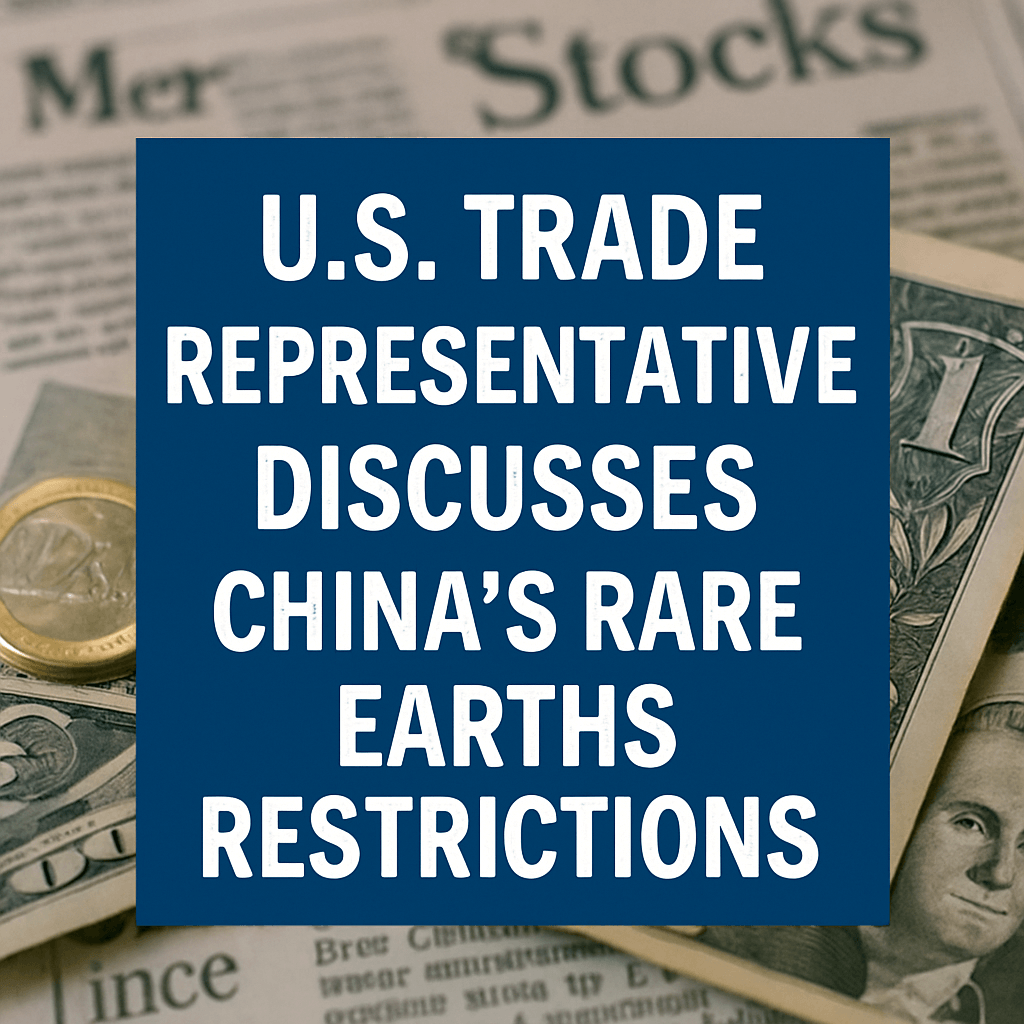U.S. Trade Representative Discusses China’s Rare Earths Restrictions

In the midst of tense U.S.-China trade relations, President Donald Trump has accused Beijing of violating a recently struck agreement that aimed to temporarily reduce tariffs and facilitate further negotiations. The deal, reached on May 12, 2023, during talks in Geneva, Switzerland, was intended to ease the ongoing trade war and allow discussions over key economic issues to progress.
The Agreement and Its Implications
According to the terms of the Geneva agreement, both countries consented to reduce their tariffs for a period of 90 days. This meant lowering the prohibitive tariffs previously imposed due to escalating trade tensions. However, shortly after, President Trump publicly claimed that China did not honor its commitments, stating on social media, “The bad news is that China…HAS TOTALLY VIOLATED ITS AGREEMENT WITH US.” This pointed out the fragility of the diplomatic effort and raised questions about the future of U.S.-China trade relations.
U.S. Trade Representative’s Concerns
Jamieson Greer, the U.S. Trade Representative who played a significant role in negotiating the agreement, echoed Trump’s concerns, asserting that China has not only failed to comply with the terms but has also engaged in what he described as “slow rolling” compliance. Greer specifically highlighted that China has yet to withdraw its retaliatory measures that target critical minerals, including rare earths, which are vital for several industries.
- Importance of Rare Earths: Rare earth elements (REEs) include 17 chemical elements that are integral to high-tech applications such as smartphones, electric vehicles, and military technology. China’s dominance in this sector—controlling approximately 60% of global rare earth production—poses significant strategic implications for the U.S.
- Current Restrictions: Greer pointed out that China continues to restrict the export of these critical elements, which hinders U.S. tech, automotive, aerospace, and defense sectors from accessing necessary resources for production and innovation.
Responses from the Chinese Government
In response to Trump’s charges and Greer’s comments, Liu Pengyu, a spokesperson for China’s embassy in the U.S., criticized the U.S. for its retaliatory trade measures, particularly in the semiconductor sector. Liu emphasized that China’s export restrictions were a direct consequence of U.S. trade policies, calling for a collaborative approach to uphold agreements made in Geneva.
Recent Developments in Trade Policies
Despite the recent aggressive posturing, President Trump refrained from reinstating tariffs against China. Earlier this week, the U.S. Court of International Trade invalidated previous comprehensive tariffs imposed on ‘Liberation Day.’ However, these tariffs were quickly reinstated by an appeals court, indicating that the situation remains fluid and may eventually require Supreme Court intervention.
Simultaneously, Trump accused the European Union of delaying trade discussions, indicating a complex web of international trade negotiations that could further complicate U.S. relations with both China and Europe.
Export Controls and Continued Trade Curbs
In a move that underscores the ongoing tensions, the Trump administration announced its own set of export curbs this week targeting critical technologies, including those used in jet engines, semiconductors, and machinery. This reflects a tit-for-tat strategy fueled by China’s perceived lack of cooperation regarding U.S. exports of rare earths.
Conclusion: The Road Ahead for U.S.-China Trade Relations
As both nations continue to engage in this mutually detrimental tug-of-war, the future of trade negotiations remains uncertain. Analysts are divided on the likelihood of a resolution without decisive action from either side. The talks in Geneva were heralded as a potential turning point, yet with both sides making accusations of bad faith, much of the outlined progress hangs in the balance. Additional rounds of negotiations along with possible international mediation may be essential to re-establish a more productive trading environment.